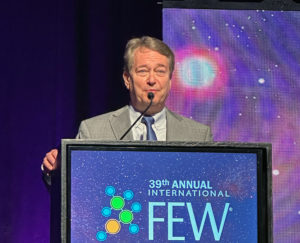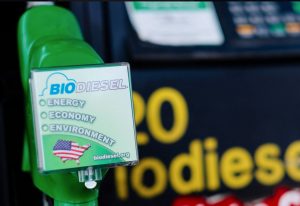 Renewable Fuels Association President and CEO Geoff Cooper offered the keynote address Tuesday at the 2023 International Fuel Ethanol Workshop & Expo.
Renewable Fuels Association President and CEO Geoff Cooper offered the keynote address Tuesday at the 2023 International Fuel Ethanol Workshop & Expo.
In his presentation, Cooper outlined the goals of the global “Energy Transition” and noted that many seem to believe electrification is the only way to decarbonize the transportation sector by mid-century. “For many, the ‘Energy Transition’ is simply shorthand for ‘Universal Electrification,’” Cooper said. “But for a number of reasons, a headlong rush into electrification is shortsighted and would almost certainly fail to achieve ambitious carbon reduction goals.”
Cooper summarized many of the challenges associated with a massive, complicated transition of the transportation sector to lower-carbon energy sources. He pointed out that there are more than 278 million passenger vehicles and light trucks in the United States today, and only 3.4 million are plug-in electric vehicles—even with record EV sales in 2022.
“Americans will continue to rely upon hundreds of millions of combustion engines and hundreds of billions of gallons of liquid fuels for many decades to come, even as more EVs enter the fleet,” he said. “If we really care about reducing greenhouse gas emissions from transportation, we need to start by increasing our use of lower-carbon liquid fuels.”
Cooper pointed to creative market solutions like RFA’s new Ford Escape Flex Fuel EV, which was on display at the FEW trade show this year, that can travel about 430 miles with a full tank of E85 and a full charge of the battery while reducing emissions as much as 80 percent compared to a Ford Escape running on gasoline.
“It is our hope that one day soon, after proving the benefits of this technology, consumers will be able to choose a true zero-emissions vehicle that meets their everyday needs and doesn’t break the bank,” he said. “And whether it is a plug-in hybrid FFV, sustainable aviation fuels, green chemicals, or fuel for heavy-duty engines, we remain very confident that ethanol can—and will—lead the Energy Transition.”
Read Cooper’s remarks.
 New research by the Clean Fuels Development Coalition (CFDC) concludes that the widespread introduction of electric vehicles as a means of reducing carbon emissions presents more challenges than a technology neutral strategy.
New research by the Clean Fuels Development Coalition (CFDC) concludes that the widespread introduction of electric vehicles as a means of reducing carbon emissions presents more challenges than a technology neutral strategy.









